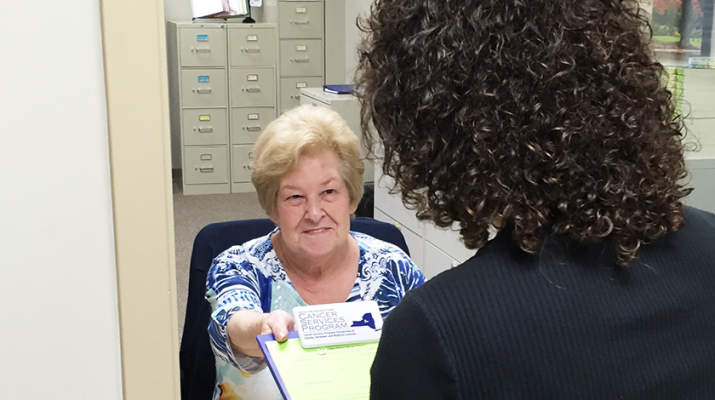The entire clinic’s staff, including doctors, nurses and clerical workers, is unpaid
By Aaron Gifford
In the Oneida Valley, a somewhat rural area about halfway between Utica and Syracuse, a group of medical professionals is not waiting around to see what comes out of the ongoing national health care debate.
Well before the Affordable Health Care Act’s inception, let alone its overhaul and proposed replacement program, volunteers affiliated with the Gorman Foundation opened up the Mary Rose Clinic, Oneida Free Medical Health for the Uninsured and Underinsured, in the Northside Shopping Center in Oneida, Madison County.
As the name indicates, the clinic mainly serves people living in or near Madison County who are uninsured or underinsured. Services are completely free to those 16 years or older. The clinic is open two days a week — Wednesdays from 4 to 7 p.m., and Thursdays from 10 a.m. to 2 p.m. The entire staff, including doctors, nurses and clerical workers, is unpaid.
From 2010 through 2016, a total of 5,506 patients were treated at the clinic. For this year, from January through the first week of March, 113 patients were treated there, said Alison Zeller, clinic manager.
“We get patients coming from as far away as Boonville or Utica,” Zeller said. “We do get a lot of people.”
On a typical day, more than 18 patients will be treated.
The clinic is staffed by physicians Riphika Martyn, Jennifer Cesana, Jennifer Quinn and John George, who retired from his employment as a physician but continues to practice on a volunteer basis. The staff also includes nurse practitioners Sharon Jasek and Deborah Hayes, and physician assistant Kaitlyn Huysman.
Physician Martyn proposed the clinic in 2009. She approached Amanda Larson, president of the Gorman Foundation, about volunteering her services. Martyn had previously opened a clinic in Sri Lanka after the 2004 tsunami. The Gorman Foundation was happy to help, providing facility space that was available in the shopping plaza. For guidance, Martyn and Larson visited free medical clinics across the region and joined the National Association of Free and Charitable Clinics.
The Gorman Foundation is based in Oneida and was established in 2003. Its mission is to improve the quality of life for present and future generations, and serves as a living legacy to Owen T. Gorman and Alice M. Gorman. Grants are only awarded to nonprofit, tax-exempt organizations that are within the Gorman Foundation’s geographic focus and areas of interest.
In 2015, the foundation awarded more than $1 million total; $99,919 of that went to the Mary Rose Clinic.
The clinic is named after Mary Rose Durfee, the sister of Alice Gorman and the daughter of a hops farmer. Durfee ran a small diner in Oneida in the 1950s and 1960s. She worked about 14 hours a day and, even though she owned the business, she still didn’t make enough money for her own medical or dental care, according to the clinic’s website.
One of the purposes of the clinic is to help people like Durfee who are working their hardest to get by but still need a hand with medical care. Durfee currently lives in Sherrill, just outside of Oneida, and continues to support and promote Central New York’s hops history.
Clinic services include basic primary care and referrals to specialists. The clinic will also pay the bills charged by the specialists. The clinic cannot treat patients who have disability claims, workers compensation claims, no fault injury claims, or other legal issues. In additional to medical care, the clinic provides patient education, disease prevention and screening, physical exams, and guidance for finding medical insurance.
Providers there stress that patients with medical emergencies should not go to the clinic. Rather, they should call 911 or go to a hospital emergency room. Also, they do not write prescriptions or give prescription refills without a physical examination by one of the clinic doctors. In addition, as a matter of policy, they do not treat patients who qualify for Medicaid or Medicare, but will allow a one-time exception in urgent situations.
Zeller said the underinsured, those who have some type of insurance plan but still can’t afford to pay for services, make up a significant chunk of the clinics patient load. The clinic also sees a fair number of patients from local Amish and Mennonite communities.
“We’re here to serve as long as we’re needed,” she said.
According to the National Association of Free and Charitable Clinics, there are about 1,200 facilities like the Mary Rose Clinic across the United States.
The Mary Rose clinic is listed on its website, along with Amaus Health Services in Syracuse and the Ithaca Free Clinic in Tompkins County. All told, the free clinics affiliated with the national organization report seeing about 1.7 million people annually for nearly 6 million patient visits. More than 160,000 volunteers are involved.
The national agency estimates that there about 29 million people who have not been able to access health insurance or care. About 83 percent of the patients who access free medical clinics come from working households, and about 75 percent of the patients have health care insurance but go to the free clinics instead because they still can’t afford to pay for services.
Locally, the staff at the Mary Rose Clinic continues to help those who fall through the gaps. The providers view this as a responsibility to be good neighbors. They partner with other agencies to give patients the best experience possible. For example, the staff of the PROS (Personalized Recovery Oriented Services) clinic located next door to Mary Rose cooks for the medical clinic staff and patients every Wednesday.
“They bring us these big trays of lasagna,” Zeller said. “There are people who are able to bring some food home and they are so thankful for everything that they have tears in their eyes.”

